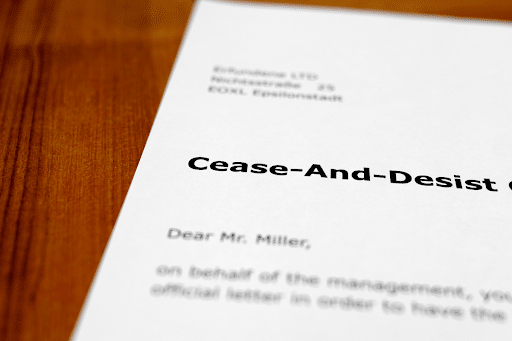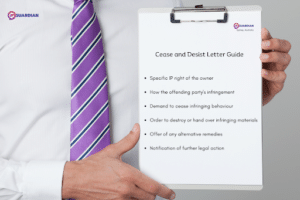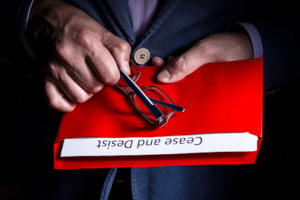- About Us
- Services
- Industries
- Resources
- Tools
- Locations
- Contact Us

Many IP infringement matters can be resolved promptly and informally out of court. In cases where they cannot, a careful approach beginning with a cease and desist letter, also known as a letter of demand, gives you the best shot at stopping the infringing behaviour and receiving restitution.
So how do you go about writing a cease and desist letter? Is this something you can do yourself or is legal advice required? What exactly should be in the letter? What if I am on the receiving end of one of these letters?
In this guide, we will answer all these questions and more so you are best prepared to deal with cease and desist letters whether sending or receiving one.
Let’s get started.
An intellectual property cease and desist letter, also known as a demand letter or letter of demand, is a letter sent to a third party that is infringing your IP rights. It notifies them of your IP rights, explains which of their actions are infringing your IP rights, and requests that they cease their infringing activity.
As a formal legal notification, a cease and desist letter is an initial step in defending yourself against theft or misuse of your intellectual property and taking action against an infringer.
Australian IP law requires plaintiffs who allege an IP rights violation to support their claim with evidence of infringement. It is also a requirement to try to settle any conflicts outside the court system and to provide the court with evidence of your attempt to settle the matter prior to going to court.
A key step in acquiring this evidence is to demonstrate that the alleged infringing party was sent a cease and desist letter notifying them of your rights, yet continued to infringe them. This is why it is always important to start with a cease and desist letter before taking things further.
A typical cease and desist letter contains a number of features. It outlines critical information about the parties involved and sets down some guidelines. A cease and desist letter typically details:
When infringement occurs, you ought to pursue legal action immediately. The cease and desist letter should be drafted and sent as soon as possible after the infringing behaviour has been discovered.

A cease and desist letter is sent to request the alleged breaching party cease their infringing behaviour. If the infringing party agrees to the letter's demands and stops their behaviour, it can avoid any unnecessary delay and expense of bringing formal IP infringement proceedings at the courts.
Issuing a cease and desist letter is generally the first step toward commencing formal legal proceedings to address allegations of IP infringement.
These letters outline exactly what the behaviour is that needs to be stopped and include statements declaring the intention to take the matter to court should the issue go unresolved.
If the recipient agrees to the demands in the letter, it may well prove to be effective in stopping the alleged infringement of the recipient without the need to escalate things further.
It is often mandatory and highly recommended that any individual claiming their IP rights have been infringed upon, to attempt to resolve these disputes using pre-litigation mechanisms such as a cease and desist letter.
A plaintiff who does not do this runs the risk of being unable to recover the costs of litigating the matter as initial, less involved methods were not attempted first. It will also be frowned upon by the court that legally requires you to try to solve the dispute without court proceedings.
Remember, a cease and desist letter constitutes important evidence demonstrating that the infringer was notified of and knew of the plaintiff's rights. This can later become vital supporting evidence of their offending behaviour and that it wilfully continued following receipt of the IP cease and desist letter.
You can elect to send a cease and desist letter whenever your IP rights are being infringed upon. There are a range of different types of IP infringements that can occur and that may necessitate sending a cease and desist letter. Outlined below with examples, these include:
A registered trademark owner can send a cease and desist letter when their registered mark is being used without permission in a way that is likely to cause confusion or deceive consumers.
Under the Trade Marks Act 1995, a trademark owner has the exclusive right to use, license, or authorise others to use their trademark within specific goods or service categories.
Copyright owners can send cease and desist letters if their work is reproduced, distributed, publicly displayed, or otherwise used without permission. The Copyright Act 1968 grants the creator exclusive rights over original works like literary, artistic, musical, and film creations.
Patent holders may send a cease and desist letter if their patented invention is being used, manufactured, or sold without permission. The Patents Act 1990 provides inventors with exclusive rights over their inventions, giving them the ability to control who can use, make, or sell the invention for commercial purposes.
A registered design owner can send a cease and desist letter when their protected design is used or applied to a product without permission. Under the Designs Act 2003, registered design owners have exclusive rights to the visual appearance of a product for a set term, typically for a maximum of 10 years.
Determining whether your rights have been infringed upon can be complex and circumstances requiring action are not limited to the above examples. If you are unsure whether your rights have been infringed upon or whether you have infringed on somebody else's, the best thing to do is seek qualified legal advice.
There is no single answer to this question. Ultimately it will depend on the individual or business receiving the letter and whether they care enough to do as requested.
A cease and desist letter is a legal document which means they are often taken seriously. It is still always worth sending one before taking further action as a cease and desist letter can often be all that is required to stop the infringing behaviour from continuing.
If a third party's business conduct is infringing your IP rights, sending an IP cease and desist letter could be an effective way of preventing it from continuing to take place.
There is no guarantee that infringing conduct will stop as a result of sending a cease and desist letter. However, individuals and companies alike usually consider that ceasing the relevant behaviour is the better choice when compared to the risks of going to court.
Fighting the accusation and incurring the expense of a protracted legal battle is something most infringers would rather avoid. Particularly if they know they are in the wrong.
It depends. An IP cease and desist letter must be properly drafted so that it has legal authority. If not done properly the court might decline to recognise a poorly written cease and desist letter.
If you intend to send a cease and desist letter, it is highly recommended that you seek expert advice from intellectual property attorneys so that the letter is effective and enforceable in court.
As outlined above, this is not recommended. Since cease and desist letters may lead to legal proceedings, it is better to have a lawyer or trade mark and patent attorney draft them.
Key advantages to doing this include:
Another thing to consider is that as we have earlier outlined, cease and desist letters can become a significant piece of evidence. This is not only regarding allegations but also when it comes to applying to request the other party pay costs.
Having a specialist IP attorney draft up a cease and desist letter on your behalf is likely much more affordable than you think. The exact cost may vary depending on how involved the allegation is, but you should expect to pay about $1,500 for this service.
Opting to have an attorney draft this for you is still much more cost-effective in the long run than the court costs you could incur should it progress further. It is also an investment in your defence as it is recognised in court as evidence whereas a DIY cease and desist letter may not be.
While cease and desist letters are recognised as a first step in enforcing your intellectual property, these letters must be carefully drafted to avoid legal counterclaims and unjustified threats which could get you into trouble. This also ensures that the IP holder’s rights can be legally enforced.
Before sending a cease and desist letter it is essential to have clearly defined your rights and have indisputable evidence of the infringement. You should also be wary of the following:
Cease and desist letters should be carefully worded to avoid accusations of ‘unjustified threats,’ particularly in patent disputes. Under the Patents Act, the alleged infringer has the right to claim damages if a cease and desist letter is found to be groundless or issued without sufficient basis.
Similar risks exist under trademark and design rights law.
A cease and desist letter should not contain false statements about the alleged infringer, as this may expose you to defamation claims. Any statements made must be able to be backed up with sufficient proof.
While pursuing infringers can indeed be a move to protect your reputation, cease and desist letters can potentially lead to negative publicity if viewed as overly aggressive. This is especially relevant where smaller businesses are involved or when addressing minor or unintentional infringements that could be settled amicably through alternative dispute resolution.
You should be prepared to follow through on any threats or directives given in your cease and desist letter. This may involve significant costs and time to pursue but is essential to establishing a firm position against this behaviour and deterring future infringement activity. Failing to follow through can weaken your position considerably.
Engaging a skilled IP attorney is the best way to ensure that your letter is expertly drafted, legally grounded and taken seriously by the infringing party.

The first thing is not to panic. Receiving an IP cease and desist letter does not necessarily mean that you are guilty of infringing the owner's IP rights, or that you have committed the alleged infringing behaviour.
Regardless, such a letter should be taken seriously — a failure to respond to the issues raised in it could result in costly legal action against you.
If you have been sent a cease and desist letter, it is essential that you methodically assess the legitimacy and truthfulness of the allegations and claims. Your response will vary depending on the exact circumstances of your case.
If the sender has good legal standing to act against you or your business, and the letter's request doesn't cause undue harm, it may be advisable to comply with it. In short, if the letter's content is true and you recognise you have done the wrong thing, even if inadvertently, stop immediately.
However, if you feel the letter is incorrect, you are able to respond to the sender with a defence that denies the allegations. If you're adamant that you're innocent of the infringing allegations, you may seek to negotiate a settlement.
If you intend to defend against an allegation of IP infringement we advise that you seek legal advice from a reputable IP law firm so that the issue can be resolved without the cost and stress of litigation. Cease and desist letters can be complicated matters and it's vital that you know your legal rights.
Whatever you do, it is important to respond. If you fail to acknowledge and respond to a cease and desist letter, a court case may be initiated by the sender against you. This is a costly, stressful, and time-consuming process that should be avoided wherever possible.
Are your IP rights being infringed? Do you need to issue a cease and desist letter? IP Guardian can help you defend your IP rights.
We understand that discovering your IP rights are being infringed upon can be stressful and overwhelming - it's hard to know where to start. Our team of highly skilled IP attorneys can help you swiftly resolve these issues by sending a cease and desist letter on your behalf.
Should you be on the receiving end of a cease and desist letter, we provide genuine, professional advice about what to do next.
If at any time the infringement action progresses to court, we are best positioned to defend your rights and protect your interests. Contact us today to speak with an expert IP attorney and take back control.

Registered Patent and Trade Mark Attorney with significant experience obtaining all forms of registered intellectual property. I hold a Bachelor of Science in Engineering, a Masters of Business Administration and a Masters of Intellectual Property. I’m passionate about showing my clients how they can protect their brands through trademark registrations.
I found them online and initially I was bit hesitant to talk to them about my problem but when I spoke to Barry, I felt more comfortable, and he gave me all the information and advice I wanted without even thinking that I am going to give him business or not. Finally, I went with them, and they made the entire process so smooth and easy for me. john was keeping us updated with each step he was doing. I would recommend these guys for any patent or trademark related service.
I would like to express my thanks to Barry and his team at IP Guardian in Sydney for their assistance with our recent Trademark application. Barry was highly professional, readily available throughout the process and clearly communicated expectations. Barry even helped us refine our application so that we had a greater chance of success which was very much appreciated to avoid extra costs. I would highly recommend Ip Guardian for all your Trademark and Intellectual Property needs.
Barry, last week, you and your professional team, made my year (or probably my next 21 years). So thank you so much for your executive, calm yet very effective actions under extream pressure. Elias Hajjar, Director, TROLLEYON PTY LTD
Informative, understood the business, what it needed and answered questions in a friendly and approachable manner. Easy decision to continue working with IPGuardian for future trademarking
From the day I contacted Barry Meskin until now with my silly amateur questions, he has been nothing short of amazing. I actually NEVER leave reviews anywhere, but I felt the need to do so for Barry and his team. I myself am a tradie, so I felt intimidated speaking to an attorney. But the second I spoke to him on the phone, he made me feel right at home. Never pressured me into any decisions, yet when I decided to go ahead with him, he delivered what I needed much quicker than what I was expecting. I cannot speak highly enough of him and recommend his services 100%.
The team at IP Guardian have made the process extremely straight forward and easy for us to understand exactly what was required. I will highly recommend to our clients who need help with IP.
I have dealt with Barry over the years, his advice and experience has helped me greatly. Looking for to working with him and his team again. Maher.
IP Guardian helps protect words, symbols, letters, numbers, names, signatures, phrases, sounds, shapes and smells. Yes, I said smells.
We've had the pleasure to work closely with Barry for many years. He has been exceptional to deal with and has a keen focus in providing a commercial led IP "go to market" strategy for start-ups and well known brands. Makes it easy and always advises on different ways to navigate through the IP process.
Barry Meskin @ IP Guardian is an experienced and extremely knowledgeable expert in the domain of intellectual property, patents and trademarks. In addition he has been extremely responsive and very professional in all our dealings. I wholeheartedly recommend Barry's services to any business or anyone seeking advice in this area - great quality and great value.